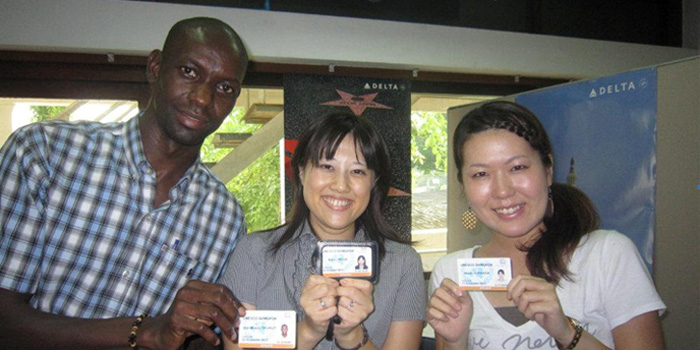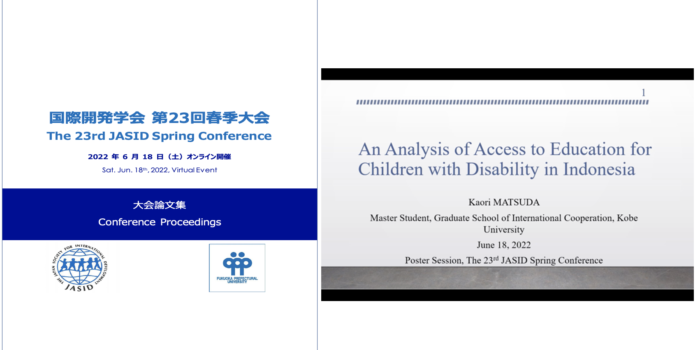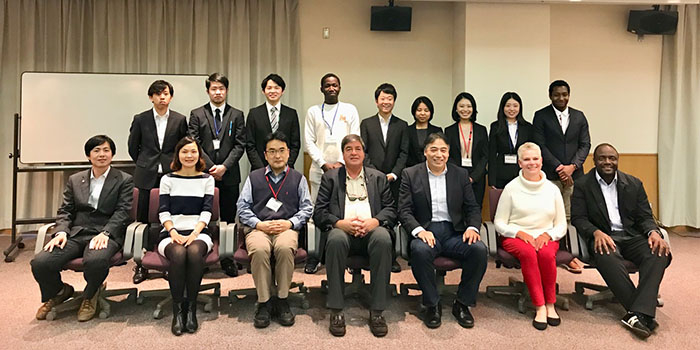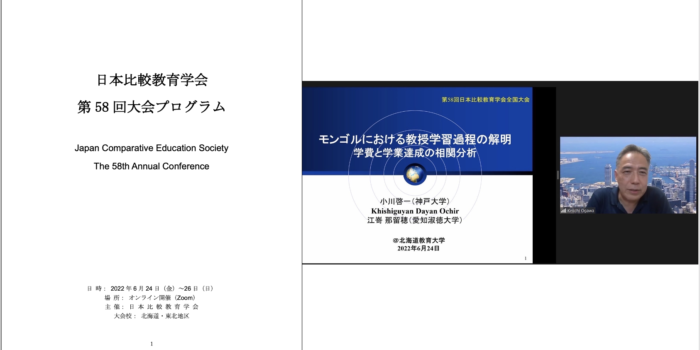1. Introduction
My names are Jeje Moses Okurut and I’m a Masters student at Graduate School of International Cooperation Studies (GSICS) in Kobe University. My student number is 104i415i. I joined GSICS – Kobe University in October 2010 and I’m pursuing a Masters Degree in Economics. My research focus is in economics of education, mainly in the quality of primary education in the Sub-Saharan Africa, with specific focus on Universal Primary Education (UPE) in Uganda.
In May 2011, I applied for internship at UNESCO Bangkok in Thailand, and I was fortunate to be accepted. My interest in UNESCO as an international organization derives from the fact that, it is one of the leading flagships of education development in the world and I aspire to gain invaluable experience in the field of education development in the global context.
During the internship I sought to not only broaden and deepen my knowledge on education policy designs, reforms, implementation and evaluation in the Asia Pacific Region, but also, gain invaluable experience that will enhance my personal and professional development, thus improving my chances of being employed by an international organization.
This report therefore is a brief account of my internship at UNESCO Bangkok in Thailand, which started in August 22nd 2011 and ended in November 22nd 2011.
2. My Terms of Reference (Tasks/Responsibilities)
 While at UNESCO, I worked as an intern in the Education Policy and Reform (EPR) Unit of UNESCO Bangkok, with a special focus on two programme areas of (i) education policy reviews and analyses and (ii) policy dialogues, partnerships and clearinghouse. Education Policy Reform (EPR) Unit TeamI worked closely with the responsible Programme Specialist and assisted in the implementation of different activities of the programme through the following;
While at UNESCO, I worked as an intern in the Education Policy and Reform (EPR) Unit of UNESCO Bangkok, with a special focus on two programme areas of (i) education policy reviews and analyses and (ii) policy dialogues, partnerships and clearinghouse. Education Policy Reform (EPR) Unit TeamI worked closely with the responsible Programme Specialist and assisted in the implementation of different activities of the programme through the following;
- Reviewing and updating country profiles: This task required me to conduct web-search of the recent educational developments in the countries included in the country profiles, reviewing and analyzing the recent national achievement and priorities in education in the respective countries, reviewing and analyzing donors’ education activities in each country and updating the information on country profiles as necessary
- Summarizing UNESS (UNESCO National Education Support Strategy) and UNEPS (UNESCO Education Partnership Strategy) documents as they are finalized: Under this assignment I was expected to summarize the UNESS and UNEPS documents submitted by the UNESCO Field Offices and integrate findings to the country profiles;
- Assisting in research on determining factors of quality improvement: Here, I was required to participate in the analysis of the data collected through the SABER (System Assessment and Benchmarking for Education Results) pilot in the Asia-Pacific Region and conducting a meta-analysis of the existing documents, studies and publication on related subjects; and,
- Perform other tasks as required: This entailed me executing/ performing other tasks that my supervisor assigned me from time to time.
3. Tasks accomplished
During my internship, I was able to execute three of the four tasks spelt out in my terms of reference. I was unable to accomplish the task of assisting in research on determining factors of quality improvement. This is because my internship period (3 months) turned out to be short to permit me the opportunity of participating in the analysis of the data collected through the SABER (System Assessment and Benchmarking for Education Results) pilot in the Asia-Pacific Region and conducting a meta-analysis of the existing documents, studies and publication on related subjects. Presented here under therefore is an illustration of what I accomplished under each task.
- Reviewed and updated country profiles: I reviewed and updated country profiles for a total of nine (9) countries in the Asia Pacific Region. The countries are Nepal, Pakistan, Philippines, Solomon Islands, Tajikistan, Timor-Leste, Tuvalu, Vanuatu and Vietnam. The information used for updating country profiles was gathered through web-search of the recent socio-economic developments in the member countries. I reviewed and analyzed recent national achievement and priorities in education, as well as donors’ education related activities/ initiatives in these countries. A typical country profile according to UNESCO Bangkok format is comprised of background information for each country, education sector overview, respective country education sector wide challenges, international cooperation education initiatives in each country, as well as education statistics in each country. Information links and sources were likewise included so as to ensure authenticity/ validity.
- Summarized the UNESS & UNEPS documents as they are finalized: I summarized the finalized UNESCO National Education Support Strategy (UNESS) and UESCO Education Partnership Strategy (UNEPS) documents from countries under my jurisdiction, as referred above. The summaries generated formed an integral part during the process of reviewing and updating country profiles.
- Performed other tasks as required including the following: I attended a four-day Synthesis Workshop on School-to-Work Transition Information Bases in Asia and the Pacific and the Role of the UNEVOC Network. The workshop was organized by UNESCO Bangkok and UNESCO-UNEVOC Bonn from 23rd – 26th August 2011 at Imperial Queen’s Park Hotel, Bangkok, Thailand.
My principal task during the workshop was to record workshop proceedings, which were later, integrated into the overall workshop proceedings report. I also executed other tasks as and when they arose such as circulating workshop documents to the participants, distributing workshop evaluation form to all the participants so as to gain an understanding of what their views, observations and opinions about the workshop as well as their suggested recommendations for future workshops. Participants at the Workshop UNESCO Staff at the Workshop.
Outside the confines of office, I was part of the UNESCO United Foot Club that represented UNESCO Bangkok during the national literacy day celebrations, which took place on Wednesday 7th September 2011. The celebrations were organized by the Ministry of Education of Thailand and were held in Chiang Mai, Thailand. UNESCO United won the match 7:0.
Lining up for UNESCO United FC In Action for UNESCO United FC Finally I also took part in a variety of humanitarian activities organized by UNESCO Bangkok Office, aimed at helping people affected/ displaced by the water floods that devastated Thailand for several months. The activities ranged from fund-raising, serving assorted food items and taking part in sporting events specifically organized for the victims.
4. My Experience and Lessons Learnt
Through this internship opportunity, I was able to experience firsthand the dynamics of working with UNESCO as an international organization. In the same vein, I read key education policy documents (i.e. Constitutions, Education Acts, Strategic Plans, UNESS & UNEPS) for selected member countries, which broadened and widened my knowledge about education globally.
The lessons learnt during my 3 months stay at UNESCO Bangkok Office were both professional and personal and they include; I enhanced my analytically skills, interpersonal skills (communications skills) and writing skills. I also improved my pro-activeness and built long lasting friendship.
I received training in two computer packages, namely Typo3 and EPSSim. Typo3 is a free Open Source content management system for enterprise purposes on the web and in intranets. It offers full flexibility and extendability while featuring an accomplished set of ready-made interfaces, functions and modules.
EPSSim was created by UNESCO in 2001 and is a generic simulation model designed to target, first of all, the ministries of education (different departments including planning, finance and personnel), and also research institutes and universities, in order to support them in the formulation of credible education development policies and plans, in line with the Education for All (EFA) criteria.
5. Challenges Encountered
 The major challenge I encountered during my time at UNESCO Bangkok Office was in the area of me adjusting to the demands/ expectations of working in an international organization (UNESCO). My past working experience was with national organizations, notably the Ministry of Education and Sports (MoES) in Uganda. However, I was able to overcome this challenge within the first month of the internship. This is because of the warm, friendly welcome and help extended to me by the members of staff of Education Policy Reform (EPR) Unit and UNESCO Bangkok as a whole.
The major challenge I encountered during my time at UNESCO Bangkok Office was in the area of me adjusting to the demands/ expectations of working in an international organization (UNESCO). My past working experience was with national organizations, notably the Ministry of Education and Sports (MoES) in Uganda. However, I was able to overcome this challenge within the first month of the internship. This is because of the warm, friendly welcome and help extended to me by the members of staff of Education Policy Reform (EPR) Unit and UNESCO Bangkok as a whole.
6. Conclusion
Despite the above highlighted challenge encountered, the internship experience at UNESCO Bangkok – a Regional Office for Asia Pacific area was an absolute success. I met distinguished ladies and gentlemen from all walks of life and shared their experiences as well as sharing my own experiences. I learnt a lot as already briefly highlighted above and I can conclusively say that; I’m more determined than ever to gain employment with an international organization.
By Jeje Moses Okurut
Related








